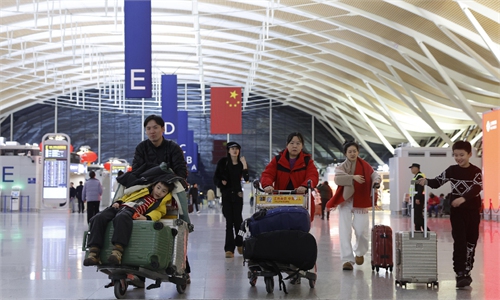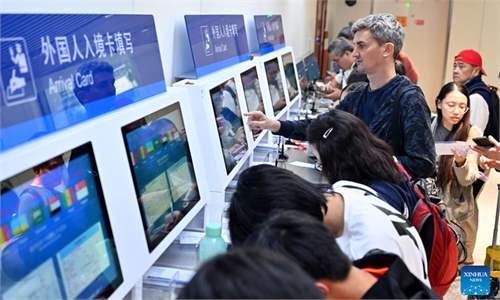ARTS / CULTURE & LEISURE
Experiential tourism holds potential as new growth driver for China’s tourism

Illustration: Liu Xiangya/GT
Experiential travel is redefining tourism. It holds untapped potential and could become a new growth driver for China's tourism industry.
Experiential travel, which prioritizes immersive and memorable experiences over conventional sightseeing, is gaining in popularity. This new wave of travel reflects a shift in the essence of tourism, one that focuses on emotional connections, cultural authenticity, and personalized adventures.
A report from online travel platform Fliggy indicates that New Year's Day 2025, despite being a one-day holiday, sparked travel interest, with popular destinations divided between "snow and ice tourism" in northern regions like the provinces of Heilongjiang and Jilin and "warm-weather getaways" to southern areas like Hainan Province and the Guangxi Zhuang Autonomous Region. Activities such as skiing and soaking in hot springs attract northern travelers, while unique southern experiences like night fishing, snorkeling, and surfing certification classes have driven a booking surge, Shanghai-based news outlet thepaper.cn reported on Thursday.
The essence of travel is evolving, placing a greater emphasis on deep, engaging experiences. Several factors are driving the rise of experiential travel in China and the rest of the world.
When searching for travel-related information, young people are not limiting themselves to sightseeing but also want to satisfy their desire for knowledge and to participate in experiences, seeking emotional connections and spiritual harmony. No matter if they are traveling to a city for a performance, a meal, or a marathon, the personalized needs of young people are endowing travel with new connotations.
Experiential travel fulfills personalized needs better than traditional vacations. For example, it allows individuals to attend performances by their favorite artists or dine at specific restaurants. Amid the fast pace of modern life, people seek travel experiences that offer relaxation and stress relief, making emotionally resonant travel products more appealing.
Moreover, there is a growing emphasis on experiencing authentic local cultures and customs, which has become a significant factor in destination selection for travelers. Embarking on these journeys allows you to return home with a renewed perspective and an enhanced appreciation for the world's diverse cultures.
For instance, Yanbian, the only autonomous prefecture for China's Korean ethnic group, has attracted many visitors with immersive activities like swing rides, archery, and traditional ethnic Korean games, as well as interactive performances such as gayageum (a plucked zither) and janggu (drum) dances. Tourists can also watch and participate in the creation of traditional Korean handicrafts and cuisine.
At the same time, digital platforms such as online travel agencies and social media provide convenient booking services and user reviews, aiding consumers in making informed choices. Social media platforms have fueled the demand for unique, shareable travel moments. Millennial and Gen Z travelers are prioritizing experiences over material goods and seek authentic and immersive trips.
The Shengshi Tangcheng Scenic Area in Xiangyang, North China's Hubei Province, for example, is the shooting site for many popular TV dramas. Young tourists eagerly share photos of the night tours at the site inspired by the Tang Dynasty (618-907), during which they rent traditional Hanfu clothing and engage in Tang Dynasty-themed activities such as reciting poetry, enjoying traditional music, and watching cultural performances.
Despite its popularity, experiential travel in China faces challenges as well. Many experiential travel businesses still rely on traditional, offline transaction models. This is particularly evident in rural tourism, where more refined operations are needed to enhance efficiency and user experience.
To address these weaknesses, we can carry out several solutions. To begin with, enhancing digital capabilities encourages a shift in experiential travel services to online platforms, utilizing digital tools to streamline the booking process and offer more accurate activity descriptions and user reviews. Then comes forging partnerships to establish relationships with business operators to expand the range of offerings and meticulously plan experiences that enhance a guest's discovery experience.
Last is offering consultations, which involves providing answers and advice to identify unmet market needs and aid in creating products that appeal to travelers.
According to the National Smart Tourism Development Report 2024 released by the China Tourism Academy, immersive smart tourism experiences have become more diverse, with 85.5 percent of tourists participating in immersive tourism activities. The report indicates that 75 percent of tourists obtain travel information through online travel platforms. This shows that the demand for travel information and the desire for new travel experiences is growing.
With the further relaxation of China's visa-free transit policy, it is expected that foreign visitors will be able to have more fulfilling experiences in China. It will be worth the effort to continuously explore how to further promote the upgrading of Chinese tourism and attract more domestic and international tourists with favorable policies. While challenges exist, the rise of experiential travel is likely to become the next growth point.
The author is a faculty member with the School of Applied Economics, Renmin University of China. life@globaltimes.com.cn



